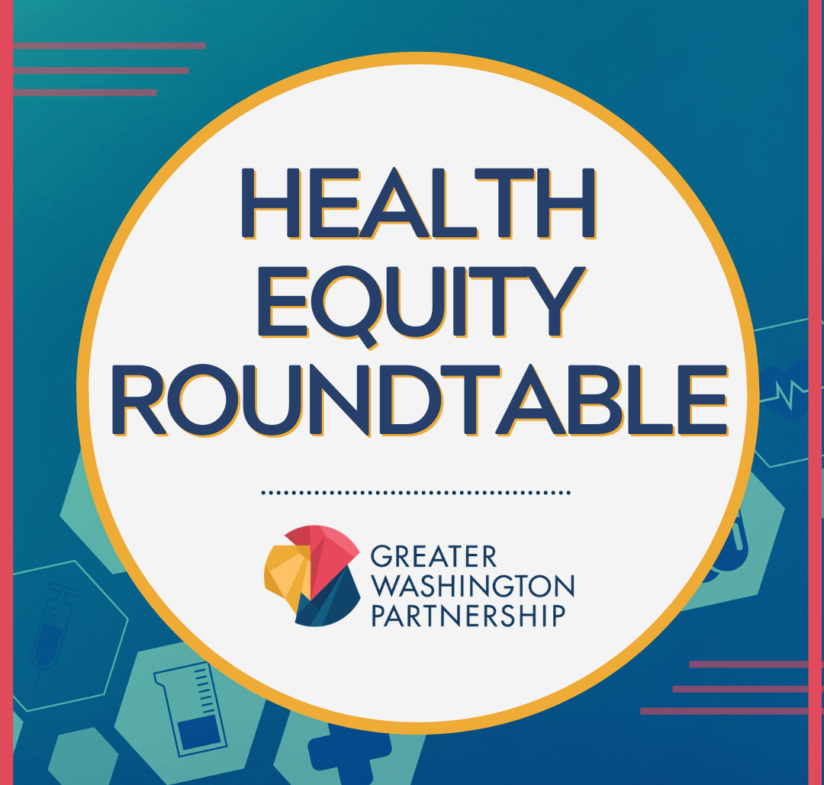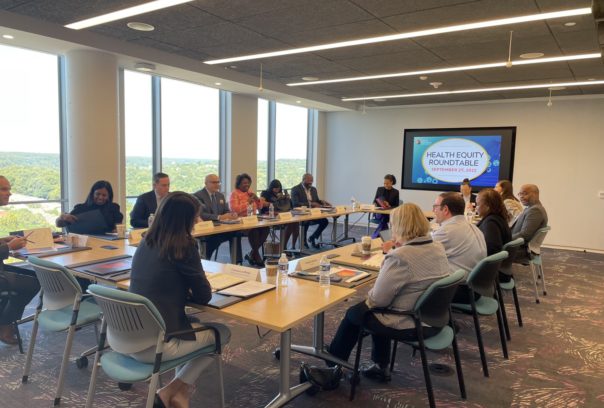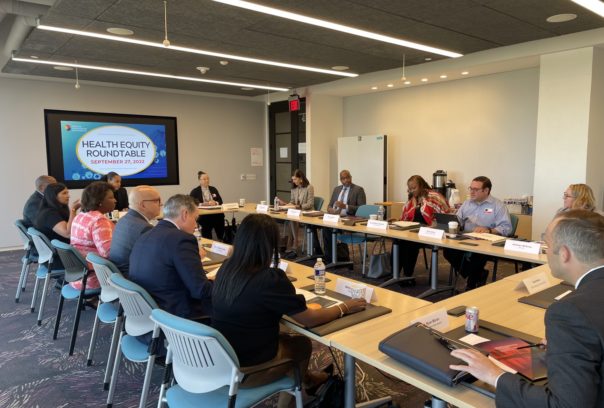
Health equity is inextricably tied to our region’s economic success – health allows individuals to pursue education, hold employment, and invest in businesses and their communities. Unfortunately, every individual in our region does not have the opportunity to achieve the full potential of their health and well-being: lower-income and historically marginalized communities consistently face greater health challenges and suffer from worse health outcomes1.
These communities disproportionately experience discrimination in care and delivery and have limited access to health coverage, quality food, and community resources2. In addition to disparities in health, these communities often face greater challenges in obtaining quality schooling, securing employment and advancing in their jobs, acquiring homes and businesses, and generating wealth for their families. These inequities in what are defined as the social drivers of health contribute to disparities in health outcomes. In fact, health care only accounts for a fraction of individuals’ health outcomes – up to 80% are caused by economic, social, and environmental drivers of wellbeing3.
As seen below, across the three metropolitan areas that the Partnership serves, average life expectancy is correlated to average household median income, illustrating the detrimental effect that poorer economic wellbeing has on an individual’s longevity.

This summer, in collaboration with Deloitte, the Partnership released its Regional Blueprint for Inclusive Growth – an integrated 10-year roadmap to guide the private sector, in concert with public and social stakeholders, to help close the region’s equity gaps and make our economy more competitive and resilient. The Blueprint identifies accessible, affordable, and effective health care as a priority and recommends the private sector invest in the social drivers of health – employment, education, transit, housing, and business ownership – to help close inequalities in health outcomes. The Blueprint emphasizes the importance of this holistic approach to successfully achieve inclusive prosperity.
On Tuesday, September 27th, in the spirit of the Blueprint’s goal to unite the region around advancing inclusive growth, the Partnership convened executive-level voices of the Board and other key regional stakeholders to discuss the private sector’s priorities, programs, and insights on health equity. The event was co-facilitated by the Deloitte Health Equity Institute, which drives Deloitte’s work in activating health equity through community collaboration and investment, data and analytics, and research and knowledge development.


The in-person discussion spanned perspectives from health care service delivery organizations to non-healthcare companies, which reaffirmed that health equity is an essential component of thriving individuals and communities, business success, and broad economic prosperity. The conversation underscored the persistent health challenges in our region, including disparities in access to affordable high-quality care, bias in healthcare, and divergent health outcomes, and the need to focus on the social drivers of health – education, employment, transportation – to holistically address health outcomes.
Inova Health’s Dr. J. Stephen Jones and Kaiser Permanente’s Ruth Williams-Brinkley shared their efforts to promote health equity both for their employees and as a provider for the community. Other participants shared their approaches and investments to elevate the health and wellbeing of individuals and families within and beyond the workplace.
The roundtable’s takeaways were clear – data is critical to understand the full spectrum of health experiences within our community and to frame the business case around health equity. Data also enables employers to better understand their employees’ health needs and develop targeted solutions.
With the anticipated end of benefits like Medicaid coverage and telehealth waivers following the declaration of the pandemic as a public health crisis, businesses can also play an important role in advocating for continued coverage for all the region’s residents.
The Partnership is proud to have companies on its Board that are prioritizing health equity for their own employees, patients and/or customers, and communities. The Partnership will use the insights from this roundtable to guide its work in skills and talent, regional mobility and infrastructure, and inclusive growth, recognizing their intersection with health equity and the foundational role that health plays in driving shared economic prosperity.
“At Deloitte, we believe inclusive growth means fostering an inclusive economy where everyone can thrive. This includes identifying and understanding root causes of inequity to help ensure social and economic mobility for our region’s residents. However, this takes all of us working collectively to design a better future. The Greater Washington Partnership has the ability to help bring businesses together and help dissect and address the systemic issues within health equity, and Deloitte is proud to support.”
– Kwasi Mitchell, Deloitte

“The pandemic showed us a broad vista of inequity and laid bare the gaps that persist and remain. We know that healthy businesses support healthy communities and at Kaiser Permanente we are committed to addressing these issues and finding solutions to improve quality of life and health. We have a unique opportunity in the nation’s capital to be a model for how others in the country advance health equity.”
– Ruth Williams-Brinkley, Kaiser Permanente

“At Inova, we are committed to knowing our patients so we can accurately address their health issues. To do this we need accurate data, and we need to rely on that data to inform and adapt healthcare delivery. Gathering these statistics tells the human story in a way that reveals nuanced differences in individuals’ health journeys and exposes the racial disparities across an array of health experiences.”
– Dr. J. Stephen Jones, Inova Health System

1Disparities in Health and Health Care: 5 Key Questions and Answers
2Regional Blueprint for Inclusive Growth, p. 97
3Social Determinants of Health 101 for Health Care: Five Plus Five
4The Greatest Gap: Health Inequity in Baltimore, p. 5
5Point2Homes
6Health Disparities Compound COVID-19 Crisis in D.C
7District of Columbia Community Health Needs Assessment, p. 17
8DC Health Matters
920 years in Richmond, Virginia
10Data included in table is from the latest year available